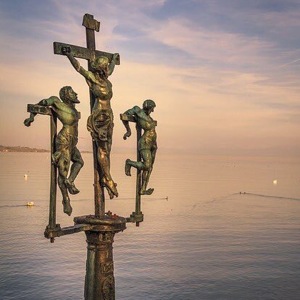
 HE FEAST of Saint John of the Cross (Dec. 14) brings to mind a fragment of a favorite hymn (text by Charles William Everest): Take up thy cross, and follow Christ, Nor think till death to put it down.
HE FEAST of Saint John of the Cross (Dec. 14) brings to mind a fragment of a favorite hymn (text by Charles William Everest): Take up thy cross, and follow Christ, Nor think till death to put it down.
Nor think till death to put it down.
This line is sometimes all I can remember.
DISCOURAGEMENT
Life is filled with unexpected discouragement. So much so, that one must expect it, and be prepared to adapt in order to survive. And working as a musician for the Roman Catholic Church is filled with fully predictable discouragement. The Universal Church is infamous for perpetuating an uphill battle to uphold its own musical and liturgical standards. The very Church that shaped nearly all of Western Music over the course of more than a millennium arguably sold out its musical soul in a few short years—a blink of the eye within its own history.
To compound such a global view, the discouraging news plays out locally quite accordingly. I have learned that no position however high profile or prestigious, no amount of longevity, and no accomplishments no matter how extraordinary render one immune from liturgical, musical, and even pastoral ignorance. Colleagues with decades of experience building up beautiful programs are routinely dismissed in further creative endeavors. I witness colleagues who have suffered physical, no less emotional problems from dysfunctional or even toxic work environments in the Church. Changes in leadership or other aspects of one’s professional environment can lead to serious vulnerability.
But this is life. Everyone deals with it in every profession. And the Church is run by humans as flawed and as sinful as me. It’s a wonder the Church has not imploded despite all its efforts to do so.
Yet the Church survives. Faith not only survives but thrives. That the Church is eternal is perhaps proof enough of the Divine. Is this hope?
HOPE
Despite such a cheerless account, so many musicians remain faithful and loyal servants of the Church throughout a lifetime. They relentlessly persist in making and creating extraordinary beauty in service of God and God alone regardless of challenge. By dogged determination, they will this beauty to come into existence. Despite having their hands tied in various aspects, art for God persists. As a result, prayer persists. Beauty perseveres because they love God and they love the Church. This is hope.
Furthermore, I witness colleagues who are deeply supportive of each other. Why? Because they know no other way. As one great musician said to me, “If we don’t support each other, who will?” This is love. This love breeds hope.
Such hopeful love is infectious. I can always rely on the support of artists—beautiful people who also possess the insight to know the tangible value of beauty.
Despite any moments of discouragement, I can rely on the beauty created by other musicians and artists to elevate my soul. One day may be bleak. But run a choir rehearsal and by the end of it, my spirit is reliably elevated to its highest point. So much so, that I rarely sleep well after a choir rehearsal. I am so energized and filled with joy that sleep is elusive. But hope is not!
I am filled with gratitude, because the love expressed by other musicians who strive for beauty for God, easily overrides the inevitable discouragement and roadblocks one will encounter. We never hope alone. Nor should we delude ourselves that all depends on us. Instead, we are dependent upon God who lifts us us in our darkest moments.
PRAYER
Overcoming discouragement is not just about riding a “high.” Furthermore, prayer is not just about the “buzz.” Prayer must be habitual, relentless, and persistent. Preparing and creating beauty for God is prayer, and prayer is powerful. Prayer is like Simon who helps carry the cross. This power that helps carry the cross is hope.
We each are called to carry a cross. Not that this justifies unjust treatment or enduring an unprofessional environment. However, we are always tested, and as such strengthened to do God’s will at every turn.
To carry a cross out of love for God and for the Church is to proclaim hope. And think not until death to put this hope of Christ down.
Soli Deo gloria
